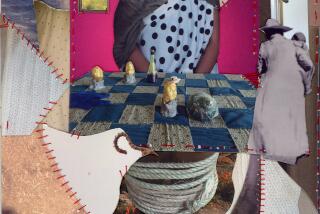Still Seeking Your ‘Inner’ Home? Find It With Feng Shui
Is your pad nearly ideal, but something is just a bit off? Maybe you haven’t located the inner home within the house. Maybe your place needs to assume its own lotus position to find true balance.
OK, some of you are giggling now.
But followers of feng shui steadfastly believe you can apply 3,000-year-old principles of Chinese mysticism to the most mundane of settings. Having a hard time imagining this? Think of David Carradine in “Kung Fu” as an interior designer. Call his little Newport Beach company, “Grasshopper Designs.”
There are several books on feng shui and one of the latest is “Quick Feng Shui Cures” ($25, Hearst Books, 2000). Author Sarah Shurety offers thoughts on everything from rejuvenating relationships and health to surviving funerals, but a big part of the book focuses on the home and office.
Several Orange County residents discussed what areas around their home or work they’d like to change. Some were enthusiastic over feng shui; others more skeptical. But they were open to suggestions, no matter how unfamiliar and otherworldly they seemed.
Roberta Gilray has no trouble slipping into the feng shui zone. She’s studied Eastern philosophy, has practiced yoga and meditation, and has visited acupuncturists for a recurring hip problem. The 59-year-old from Fountain Valley says she’d try anything if it could better her environment.
“I’m not a very judgmental person,” Gilray said. “You can learn from everything.”
Lately, she’s been thinking of painting the interior of her small home. The first thought was “a simple off-white,” but Gilray would consider other hues, especially as accents or in individual rooms.
Shurety writes one shouldn’t underestimate the importance of color.
“Every color carries a different vibration,” she claims, “and so the way we use color can subtly or dramatically change our lives.”
It’s all symbolic, of course.
White, for example, Shurety writes, “represents purity and new beginnings.” It’s a good general color for most areas, especially the children’s room and home offices.
But if Gilray wants to be more flamboyant, she could try blue (“representing faith, fidelity and consideration”), green (“tranquillity, peace and growth”), yellow (“wisdom and patience [and it] stimulates mental clarity and energy”), brown (“practicality and reliability”) or red (“the luckiest and most auspicious color.”)
“A light, very light, blue could work because I like the cool effect, and [the symbol of faith] sounds nice,” Gilray says. “Red sounds like the best one [for its symbolism], but I could only take a little of that, maybe as a trim. I know it’s a very lucky color.”
Robert M. Smith of Westminster was highly doubtful that feng shui could make his spartan home office any more inviting. Besides, isn’t an office suppose to be a little plain?
“I have my computer, phone, papers, desk, that’s about it,” Smith says. “I only spend as much time as is absolutely necessary in there.”
Still, Smith wouldn’t mind making it a little more appealing. He was thinking a picture or two. Maybe some drapes to replace the blinds. But feng shui proponents might have other ideas.
The office, Shurety writes, “is where you may spend eight or nine hours a day so it needs to be a clean, vibrant place.”
That means clear it of clutter. Then, put in a few select symbols to generate a flood of good vibrations. For starters, pick up a glass or crystal figurine of your Chinese zodiac sign to “give you a stronger sense of self and more power.” Not sure what yours is? Just go to a Chinese restaurant; if you haven’t noticed already, most have calendars as place mats.
You could also put a carp painting on the wall because it suggests “perseverance and money [or gain],” which, of course, is what every home office is really about. You can also hang an image of a mountain for “strength and endurance,” buy a turtle figurine as a metaphor for “longevity and learned wisdom” and bring in fresh chrysanthemums for “riches and laughter.”
None of it clicked with Smith. Apparently, all the symbols he needs for inspiration can be found in his wallet.
“Flowers sound nice and I know my wife would like that but I probably won’t do any of those things,” Smith sighs. “Removing clutter, that’s good. The rest I’m not so sure about.”
Like a lot of guys in their 20s, Samuel Olmos is messier than he’d like to be. Certainly messier than his girlfriend likes him to be. When told that feng shui backers might have some notions on how to de-clutter his Huntington Beach apartment, Olmos asked, “What’s feng shui?” After an explanation, Olmos still frowned, “What’s feng shui again?”
Anyway, Shurety has these tips:
* Listen to lively music while you clean to make you more active.
* Talk about the benefits of having fewer possessions until you feel inspired.
* Throw away anything that is cracked or broken.
* Adopt the Chinese habit of cleaning for the 15 days leading up to the New Year.
* Start small--perhaps with a kitchen drawer. Then work up to the bigger tasks.
* Invite friends over regularly so you get into the habit of cleaning up for their arrival.
“Those I can do,” Olmos says. “Especially having friends over. That would get me in the mood [and] maybe I could even get them to help out.”
Emily Davies is looking for decorating tips. Davies and her husband, William, are happy with their Seal Beach home but wouldn’t mind tweaking the interior some. Shurety has ideas if Davies wants to meditate on a feng shui ambience.
For one, use mirrors. Feng shui is big on them, and not just for satisfying a vanity jones. “Mirrors are often referred to as the aspirin of feng shui,” Shurety says. “They are very powerful and can energize a room.”
Shurety also says you shouldn’t take lighting for granted. Lamps that cast light upward “raise energy and generally create a bright atmosphere.” Down-lights, on the other hand, “can help you feel more grounded.”
And you can’t have enough plants, as long as they’re kept healthy. “Most places in your home will benefit from plants,” Shurety writes. “Plants represent growth and they absorb negativity.”
Not bad, says Davies, but she’ll take all the feng shui input with a grain of salt. “I love mirrors and plants anyway, so I’d go with that,” she says. “I suppose if they make you feel good [then they’re valuable on their own terms]. I don’t know if they can change your life [and] make it more peaceful and all, but who cares, if you like them?”
More Feng Shui
* Karen Rauch Carter, the author of “Move Your Stuff, Change Your Life: How to Use Feng Shui to Get Love, Money, Respect and Happiness,” will discuss and sign her book today from 3 to 5 p.m. at Barnes & Noble bookstore, 13721 Jamboree Road, Irvine. (714) 508-9797.
More to Read
Sign up for our Book Club newsletter
Get the latest news, events and more from the Los Angeles Times Book Club, and help us get L.A. reading and talking.
You may occasionally receive promotional content from the Los Angeles Times.








